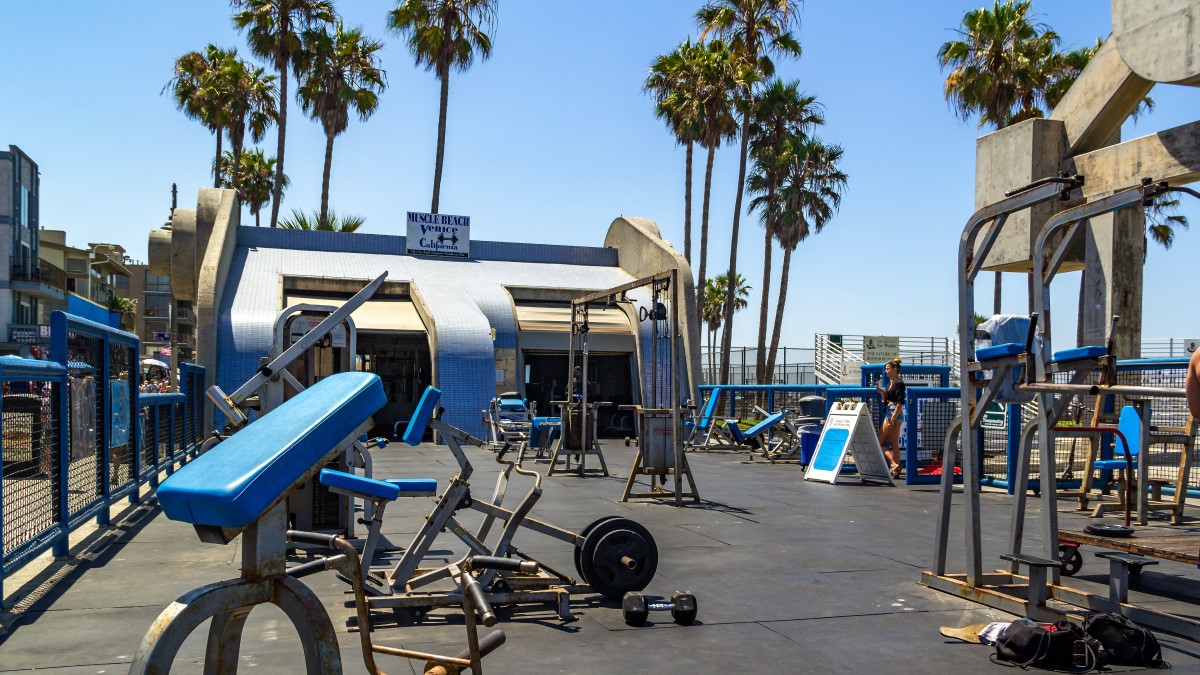Table of Contents
Introduction: General Considerations
Nothing like the feeling of freedom in an outdoor gym, in a backyard or on a patio, in fresh air and sunlight. It’s possible to keep your gym equipment in reasonably good shape even outdoors.
The main issue is rain or even nighttime dew. If it’s outside, it will get wet, leading steel parts to rust. Secondarily, rubber, vinyl and plastic could suffer from UV damage without proper care.
The most basic thing you can do is to situate things in a way where a minimal amount of material is sitting on the ground/concrete where water can pool up on at the feet. That’s what will cause it to rust quickly. If water can drip off it’s much better.
An open-air gym, covered by a roof, brings far less potential for rusting or UV damage than a gym totally exposed to the elements. Moisture can still get blown in from rain mist. Overall it’s nearly as protected as a garage gym.
Weight Bench
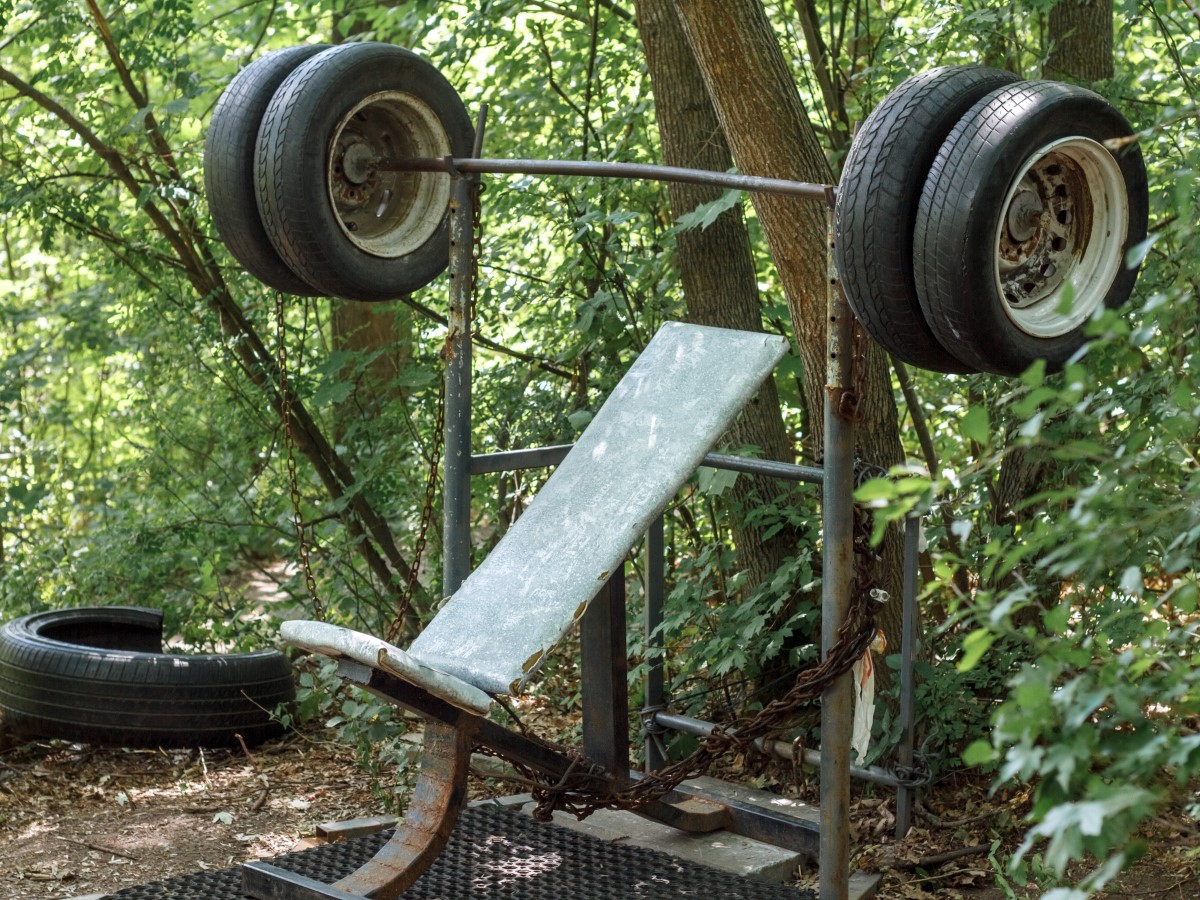
Keep the vinyl on your bench in better shape than the one above by spraying on protectant.
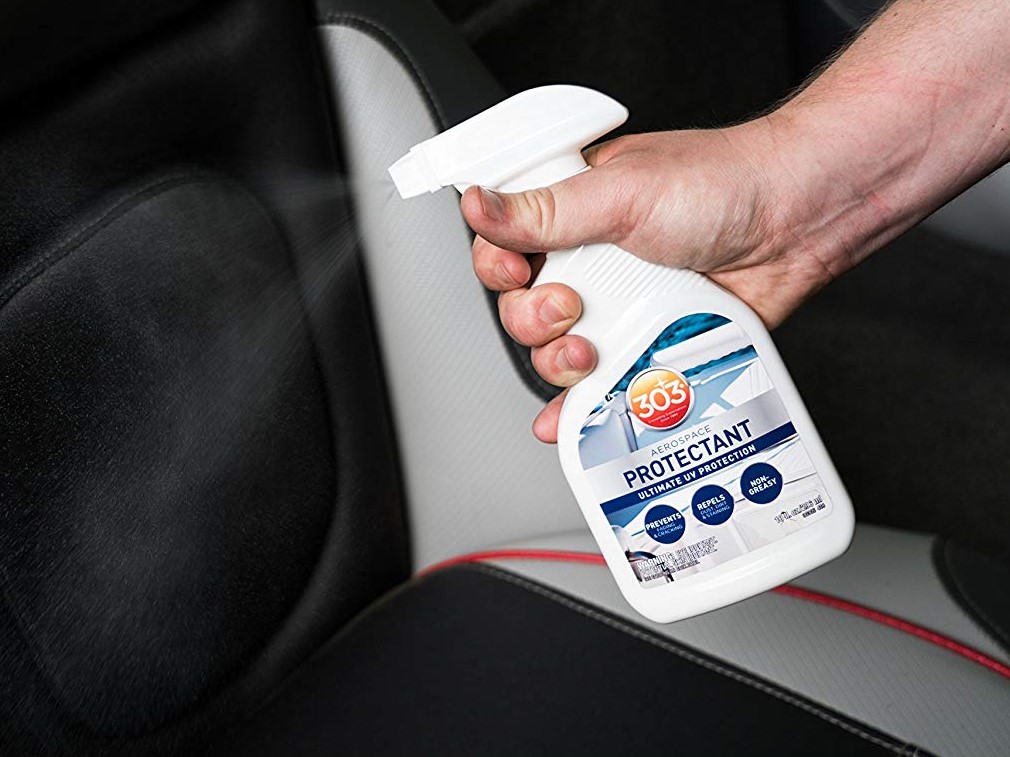
303 Aerospace Protectant is well-known for its effectiveness on the surfaces of anything exposed to the elements. It will protect vinyl upholstery on weight benches and help seal the seams against moisture creeping in. It’s also good for any rubber or plastic. It goes on “dry” without a slimy residue.
Wipe the steel frame down once a month with mineral oil or 3-in-One Oil. Keep an eye on any spots where the paint is rubbing off, particularly on the bar catches if they don’t have UHMW plastic liners to protect them and the bar, and use touch up paint as needed.
Power Rack
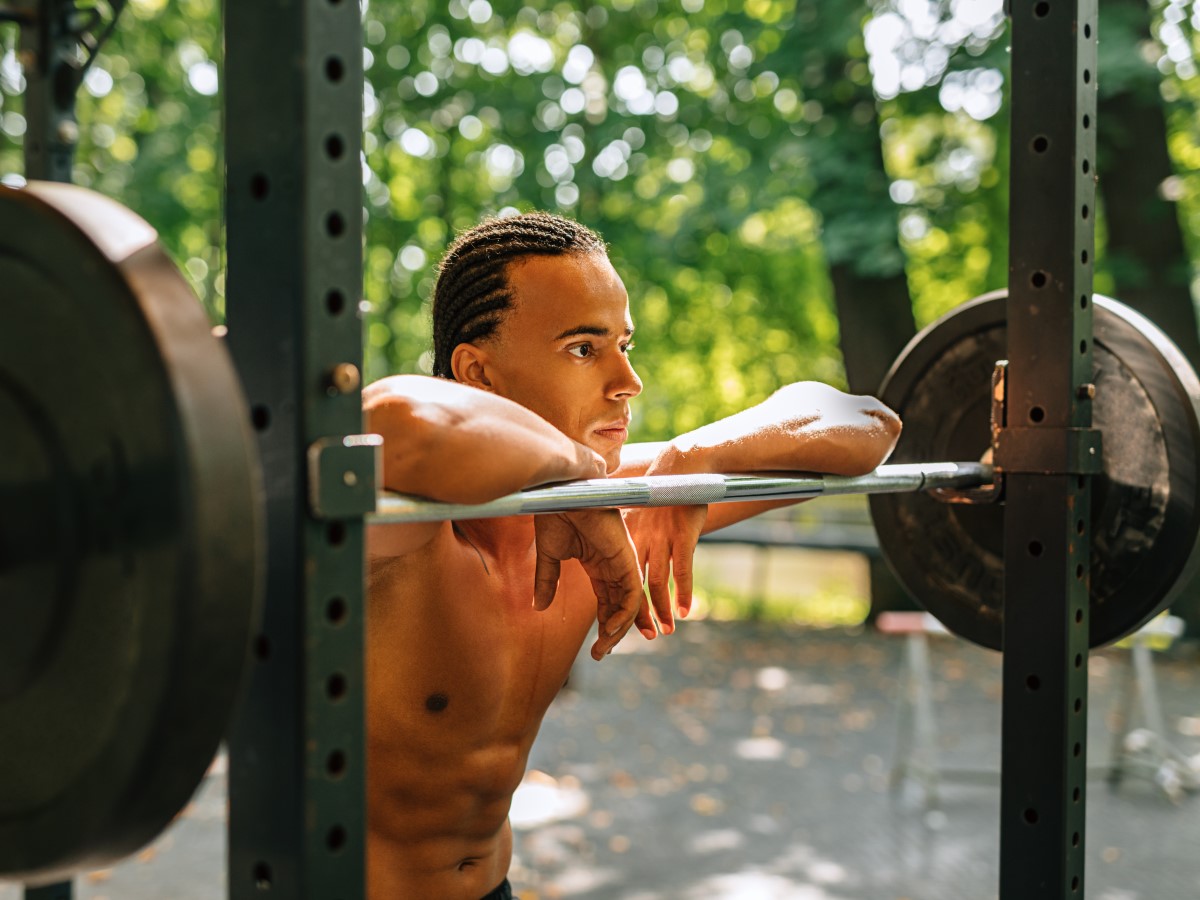
Spray all exposed parts of nuts and bolts with a enamel paint – a matte clear coat will look the best if you can’t match the rack’s color exactly – to give them extra protection. They are likely to rust before anything else, given the scratches on them from being tightened. Don’t spray them before assembly, or they might be hard to tighten.
For any kind of power rack or squat rack used outdoors, the paint company Eastwood has a spray bottle of interior frame coating, with a tube that’s perfect for sticking inside the holes on the uprights of the power rack. Cover all the rack holes with some painter’s tape, poke the tube into a small hole you make in one piece of the tape in one hole (you don’t want the paint to spray back out), and give it a good spray all over the inside. It takes some guesswork in aiming the tube. Do it through at least a couple holes to be sure you’re coating the inside. Truthfully, I think you could use any enamel paint. It’s the spray tube that’s key.
If the rack is exposed to the rain, or to significant mist in stormy weather, drill small holes into the lowest part of the uprights so that water can drain out.
As far as the outside of the rack, it’s the same as a bench frame as described above. Wipe the steel down once a month with mineral oil or 3-in-One Oil. Very little oil is needed, and you can wipe it off pretty well for a thin coating. Keep an eye on any areas of paint being rubbed away and touch it up, like where your power rack attachments rub against the uprights. This is where high-quality attachments will help that have UHMW plastic to contact the rack’s uprights instead of steel-on-steel.
If you’re using safety straps in lieu of safety bars, I would spray them with the 303 protectant mentioned to stop the UV from getting in and weakening them.
Ideally, throw a tarp over the squat rack to cover it between workouts.
Barbells
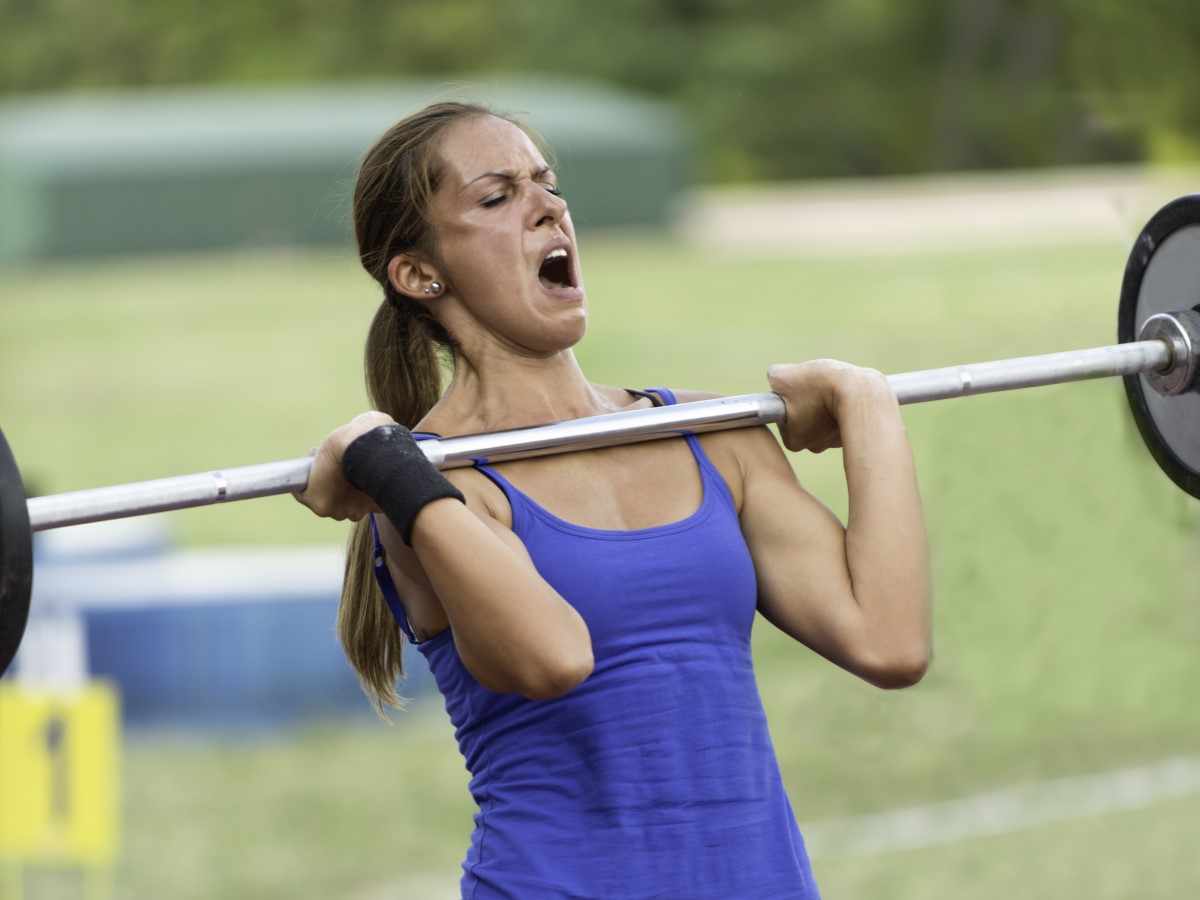
If you want to care for one thing, it’s the bar. You can let everything else rust if you don’t care enough. But take care of your bar. I wrote a long post on preventing rust on olympic bars, and it applies doubly here. Take the steps outlined in that post.
A stainless steel bar does the best outdoors and does not require any maintenance on the shaft. The worst is a bare steel bar, and the next worst is a black oxide or zinc coating that is okay at first but can start to wear off a little and allow moisture to touch the steel.
Most importantly, keep moisture out of the sleeves so they can continue to spin like new. Spray WD-40 on that area around the ends of the shaft to repel water. If you have some kind of fabric sleeve to cover the bar sleeves, or the whole bar, that could be handy. Otherwise, at least drape a tarp over it to stop most moisture and prevent birds from crapping directly on it (nice perch).
Consider bringing your bar into some covered area for storage between workouts and avoid much of the hassle of maintenance. It’s the one piece you want to keep in good shape.
Bumper Plates or Rubber Coated Plates
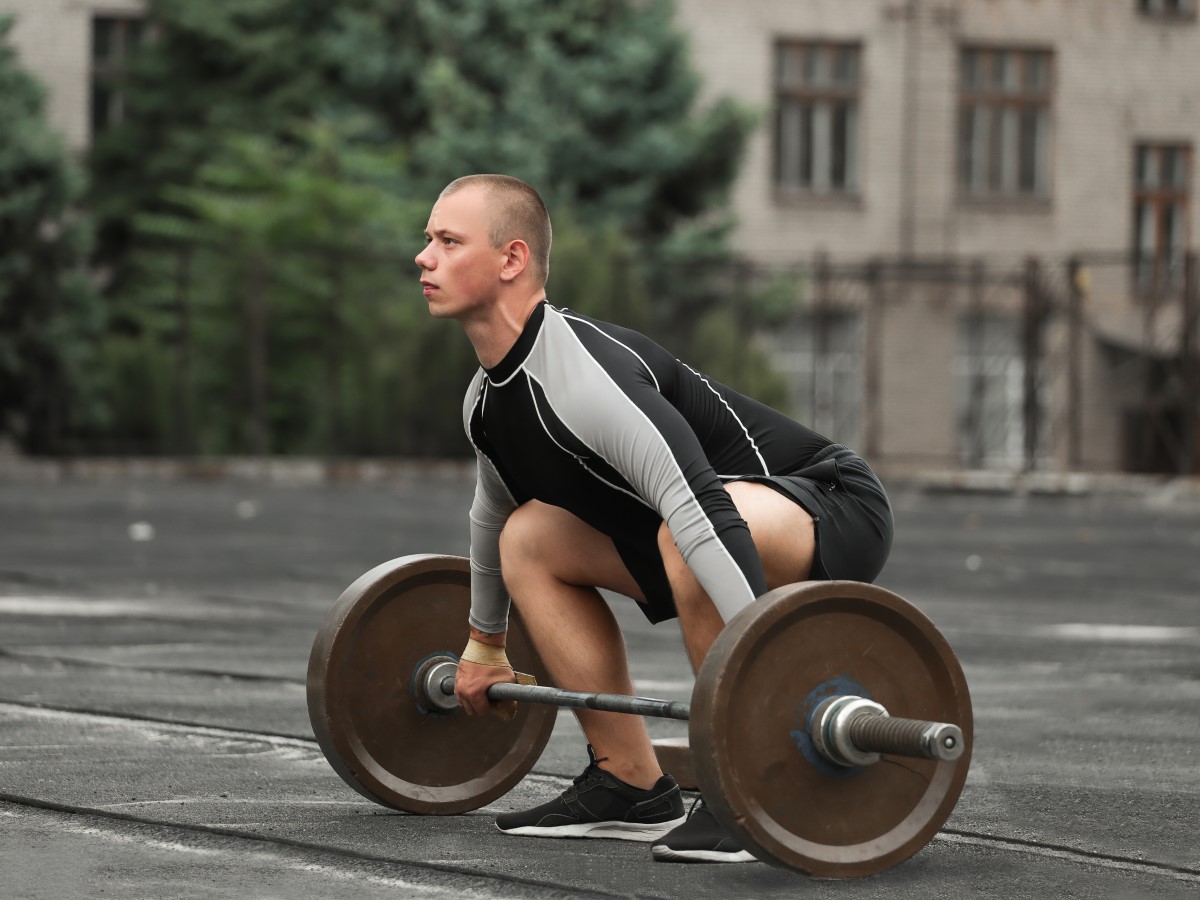
Rubber expands and shrinks in the heat and cold, leading to premature degradation. It’s not ideal for outdoors. Urethane doesn’t have that problem but is expensive.
Coat the rubber with 303 Protectant as described above for the weight bench.
For any non-coated iron in the center hole of rubber coated plates or urethane coated plates, rub mineral oil or 3-in-One oil over it, even if it’s painted, and wipe it dry so there’s no excess to get on your skin. A light coating will remain. Bumper plates use a stainless steel hub, which prevents rust pretty well.
Iron Plates, Dumbbells and Kettlebells
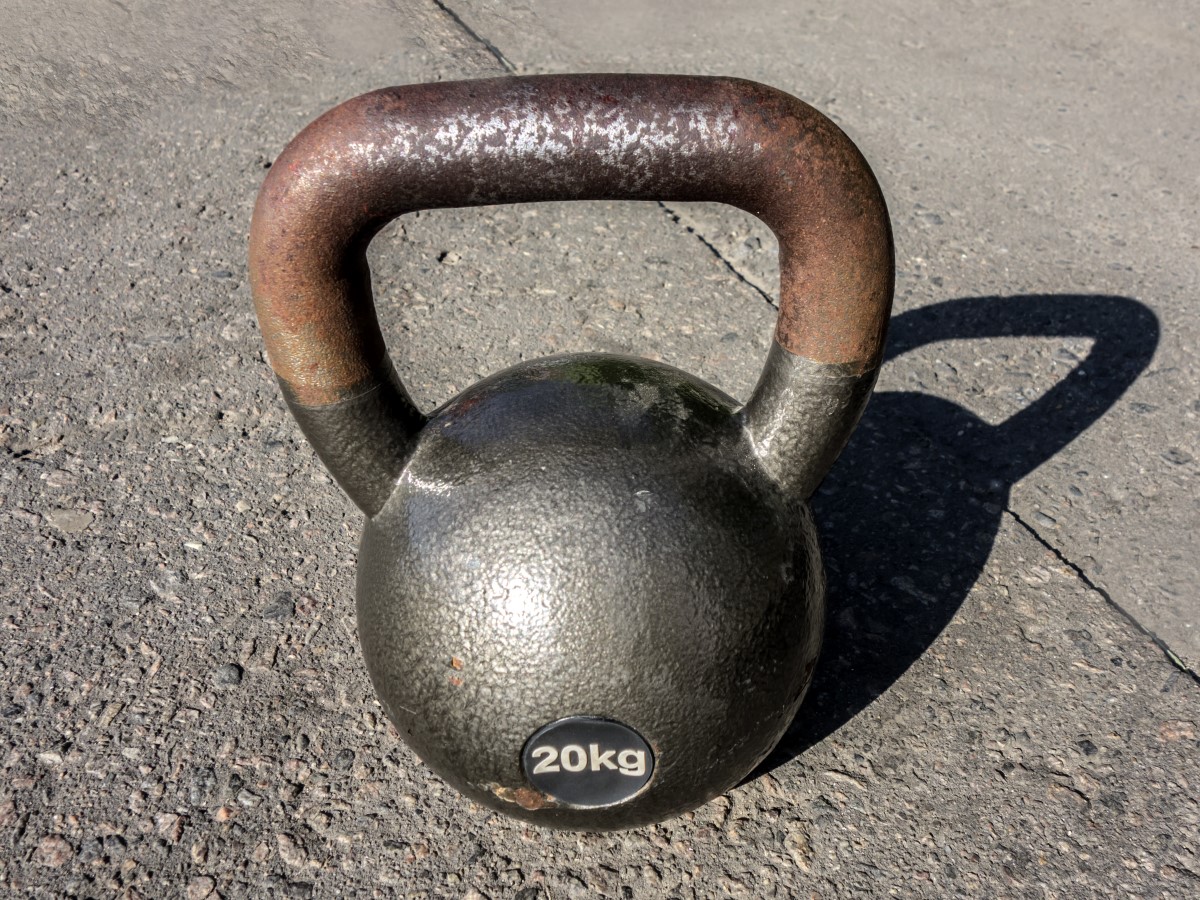
Any kind of iron weights need to start with a good paint job. For older weights that need some work in that department, see more info about that in the weight plates restoration article. It applies pretty much the same to kettlebells and iron hex dumbbells.
Rub mineral oil or 3-in-One oil with a rag all over any painted iron surfaces, and wipe dry so there’s no excess to get on your skin. A light coating will remain that you won’t really feel. The oil along with the paint underneath should do a good job.
Spray and wipe any rubber surfaces with 303 Protectant as described for other equipment.
Keep them on some kind of rack that water will drain off of, or drill drain holes in the rack. Plates are easily stored on a plate tree. A small number of kettlebells can sit on any kind of wood shelf or grate easily enough.
Weight Machines and Cardio Equipment
Any piece of equipment with moving parts could run into a problem if left without care. Moisture will get in the cracks between the moving parts, and rust will form. It’s best to cover it with a tarp between every workout.
Cardio machines as a rule do badly outside. The smooth movement is critical, and any water or dirt getting in will mess it up.
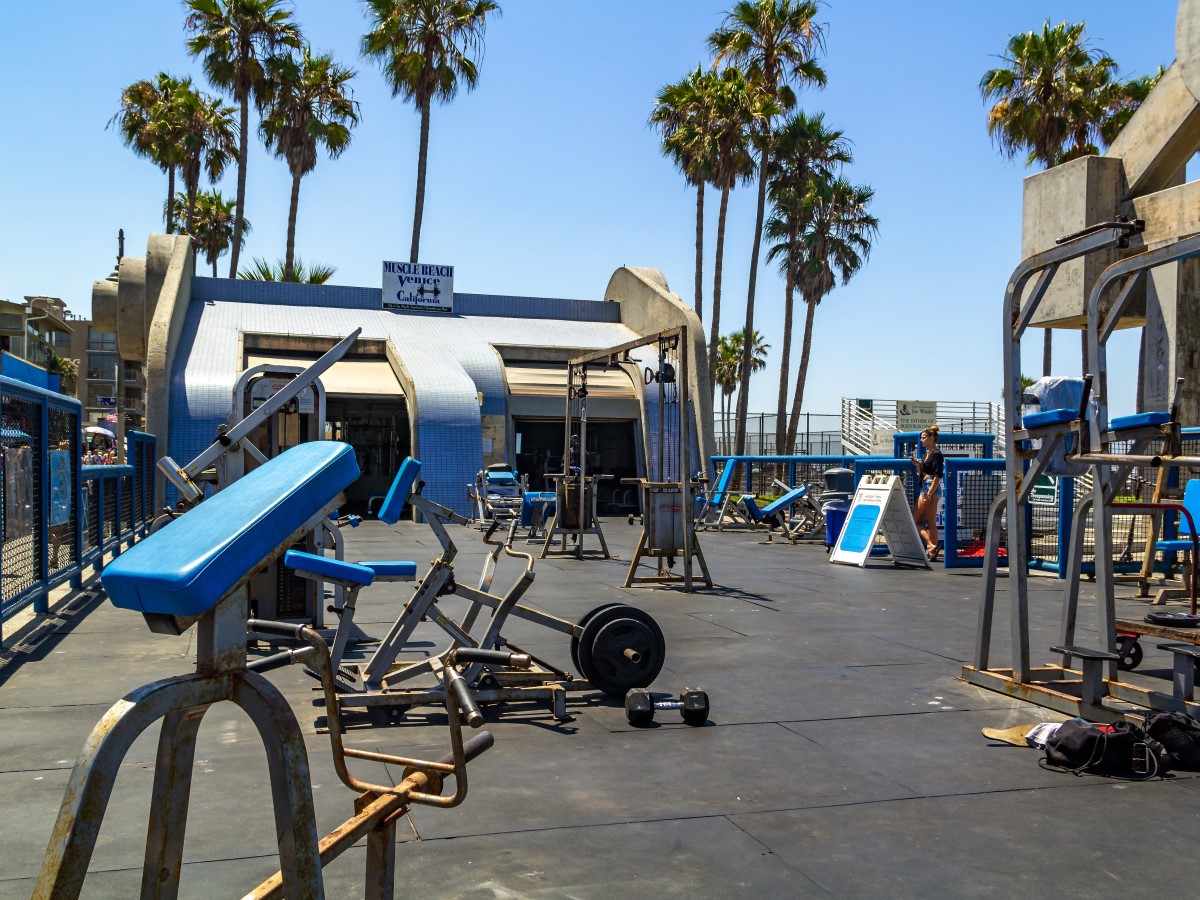
Some weight equipment may last for many years. Muscle Beach is a famous spot that for decades has had an outdoor gym full of machines, right next to the ocean, where the machines obviously show some rust and have fared okay.
Covers
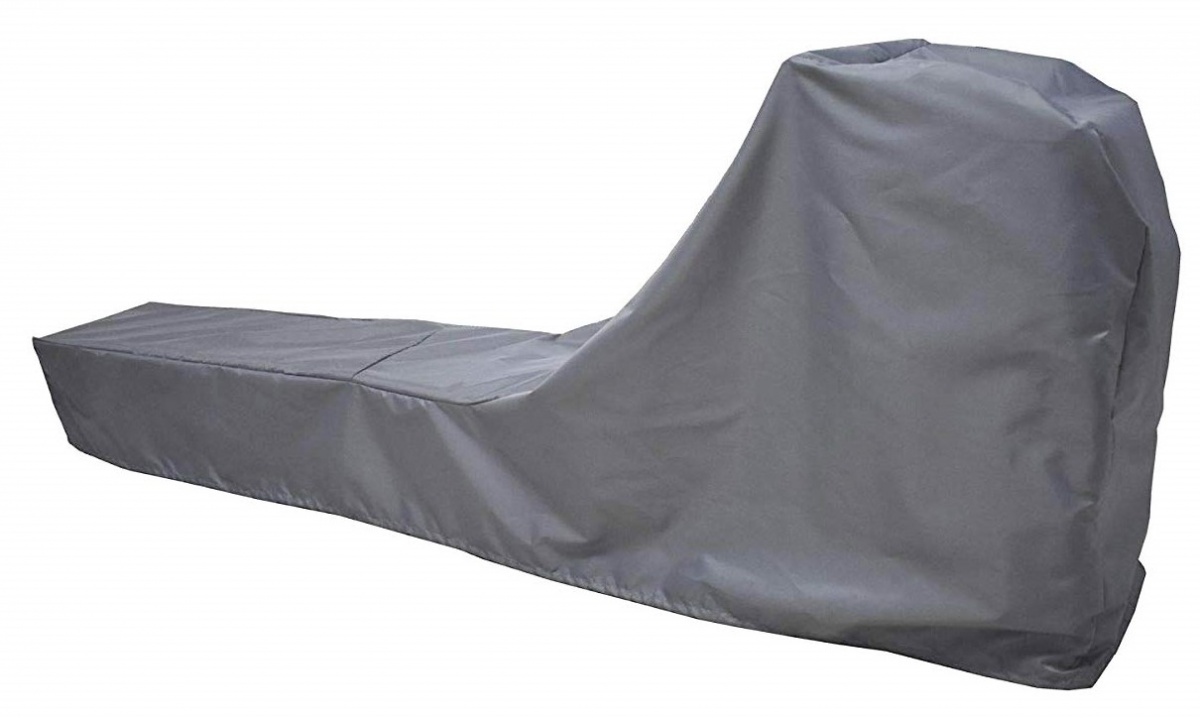
There are covers you can get for cardio equipment, like the above waterproof cover that fits the Concept2 model D and E rower.
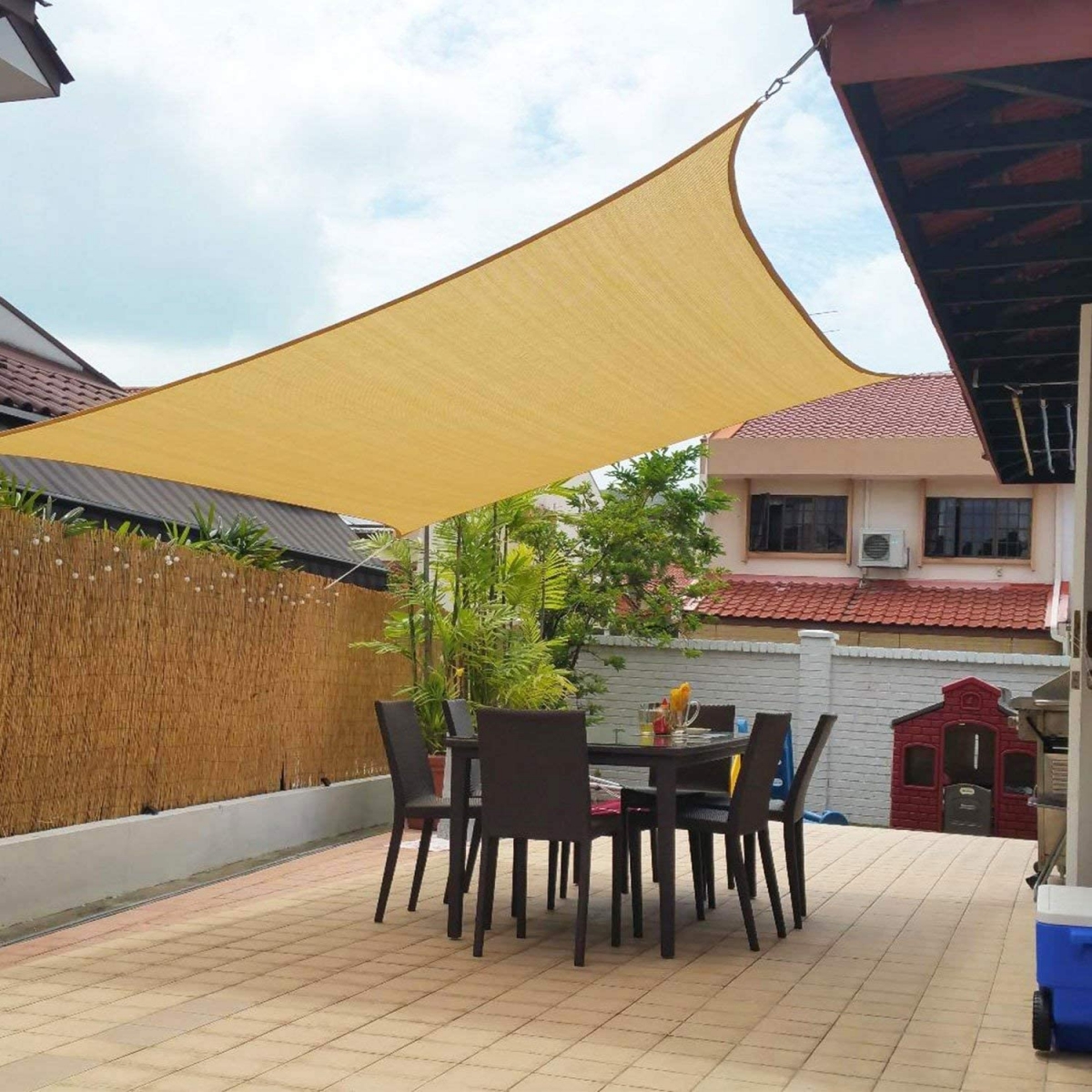
If you have things to tie it to, a large water-resistant shade like the above could do the trick for your gym area. Obviously some rain could blow in.
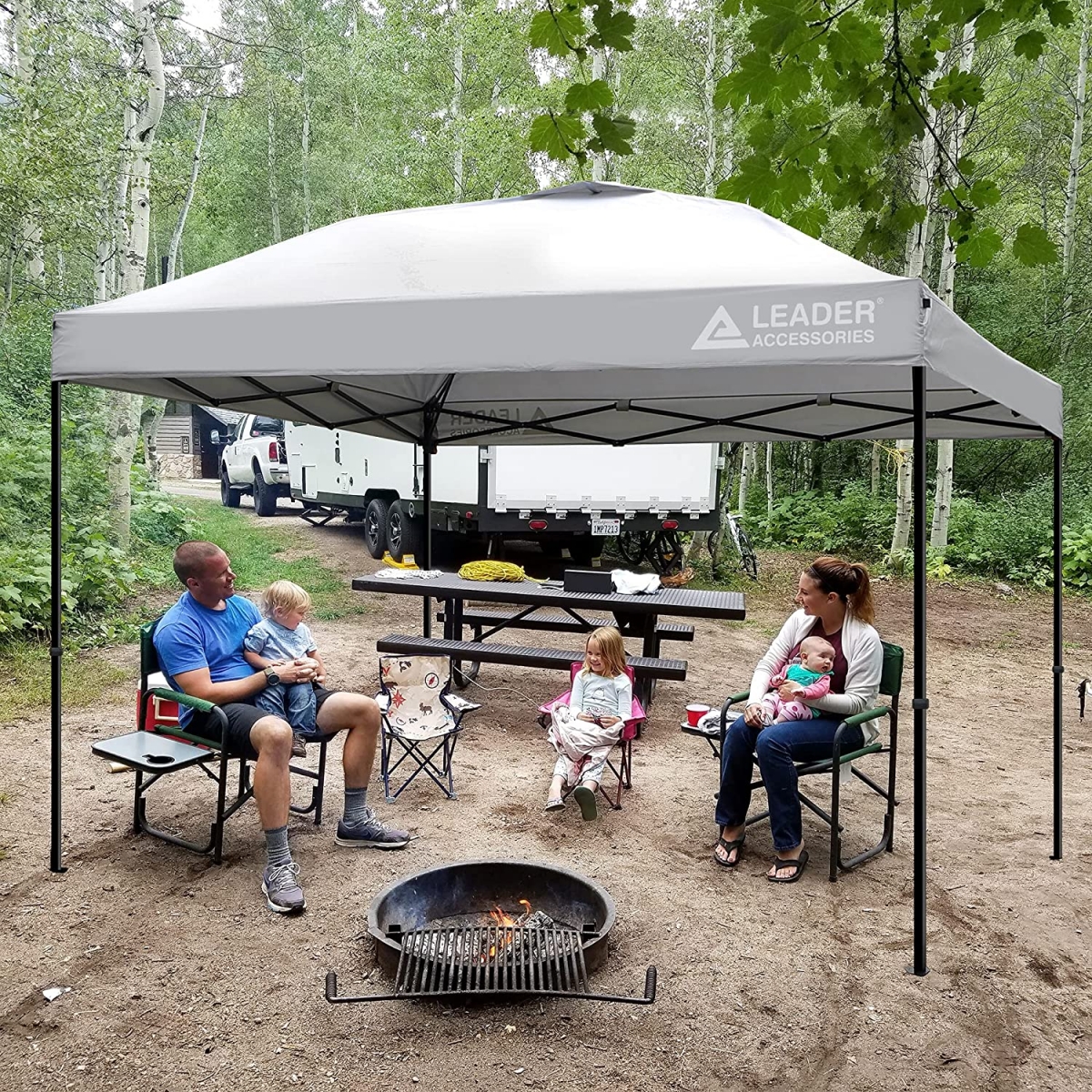
A whole standalone canopy tent like the above would be ideal, but unfortunately these are hard to find in a height suitable for overhead pressing, etc.

